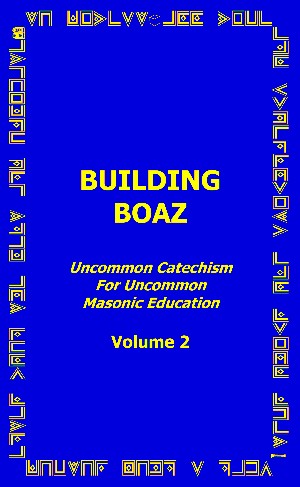I have come to find that modern Masonic literature can be compared to the preparation of food. Some Masonic literature is too light to satisfy the appetite and too bland to excite the senses. Other works on the subject of the fraternity are too rich and overpowering to the palate and leave the reader with a case of indigestion as he struggles to comprehend the knowledge contained within them. It takes an expert chef—or in this case author—to find the right combination of ingredients so that the flavor is complex but not overwhelming and the reader is left full but not gorged.
Dr. John Nagy has found this balance again in Building Boaz, the second volume in his Uncommon Catechism for Uncommon Masonic Education series. Building Boaz focuses on the symbolism of the Entered Apprentice degree using the Inquiry-Response format of the time honored Masonic catechism. It examines the lessons taught to us in Entered Apprentice degree and expands upon these themes in order to unveil a deep, intertwined network of the order’s philosophical precepts.
Building Boaz facilitates the advancement of Masonic comprehension for both the newly initiated Apprentice as well as the experienced Master. The book challenges the reader to form a deeper understanding of the initiatic rituals throughout the book. Dr. Nagy finds a way to connect Masonic ritual with the Bible, the Nag Hammadi Scrolls, Greek mythology, classical literature, and other great sources of moral instruction without making the subject matter cumbersome to even the most novice student of Masonry. This makes Building Boaz a refreshing and insightful review of the first degree of Masonry.

Building Boaz Uncommon Catechism for Uncommon Masonic Education Volume 2 by John Nagy
Dr. Nagy’s efforts have created an educational product which fills a void in today’s Masonic literature. For hundreds of years, the Freemason’s catechism has formed the backbone of the institution’s moral instruction. The catechism has instilled the basic principles of the fraternity in the minds of it’s initiates and served as the gateway to further exploration of Freemasonry’s allegorical concepts. However, in modern Freemasonry we find that the catechism is often seen in one of two opposing viewpoints: archaic and out of date or as the be-all and end-all of Masonic instruction. Building Boaz, like Nagy’s previous work Building Hiram, restores the catechism to its rightful place in Masonic education as both the staple of the Mason’s instructional diet and the springboard to a higher understanding of Masonic teachings. Not only does this format make the information contained within the book easy to comprehend for the reader, but it also allows the book to be used in the lodge for Masonic education without any further digestion. This eliminates the intimidation which many modern Freemasons face when trying to develop an educational presentation for their assemblies.
I will personally be making Building Boaz required reading for all of my future Masonic proteges and encourage all Freemasons to read this book and address the questions that it will cultivate in their minds. I hope that Building Boaz may enhance your Masonic experience as much as it has enhanced mine.
You can purchase the book here.
